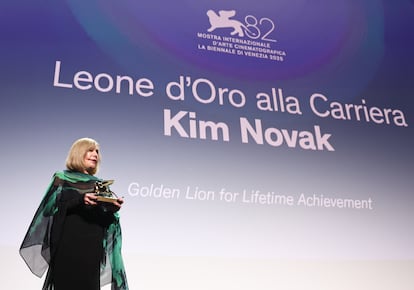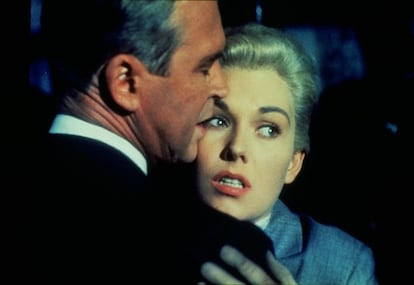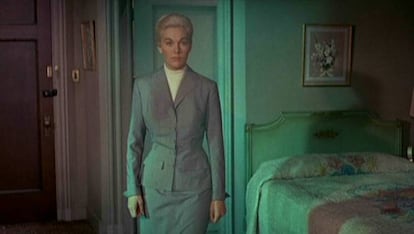Kim Novak, actress: “In Hollywood, you're worth as much as your last movie.”

Hollywood always sells itself as manufacturing dreams. For Kim Novak, however, it plunged her into a nightmare. It gave her glory, fame, public adoration . And, forever, the lead role in one of the most important films in history: Alfred Hitchcock's Vertigo . But, at the same time, the film industry was beginning to deprive her of the most important thing: herself.
She began to notice that her identity was merging with the characters, who were trying to transform her into something she wasn't. So she left, just as she was riding the crest of her wave. She stepped away from the spotlight, retreated to her home in Oregon, and devoted herself to painting and caring for jungle animals. They, at least, treated her for who she truly was, as she recounted yesterday, Tuesday, in her only interview with Spanish media at the Venice Film Festival. Because the actress, almost 60 years later, is back. To collect the Honorary Golden Lion. To star in Alexandre O. Philippe's documentary Kim Novak's Vertigo . And to finally tell her story.
She is 92 years old, with a deep voice and measured speech. However, she doesn't hold back on any subject presented to her, even at the cost of expressing her rejection of Sydney Sweeney portraying her in an upcoming biopic. "It's nice to be able to express how I feel now," she asserts. They tried to stop her many times. The first, she confesses in the documentary, was her own mother: she wanted an abortion before she was born, in 1933, like Marilyn Pauline Novak . She says that her mother, in any case, gave her self-confidence. Her father, on the other hand, conveyed to her that he wasn't proud of her. Her idol was her grandmother. And, later, Greta Garbo, in whom she saw herself reflected, fragile and shy, yet powerful.

A model and art student, she entered Hollywood at 21 by chance: she accompanied a friend to a casting . But a talent scout noticed the young woman's magnetism, and Columbia Pictures signed her. From then on, Harry Cohn, the dictatorial and bullying studio boss, tried to mold her to his own taste. She couldn't be called Marilyn, because Monroe would overshadow her. She had to change her hair color, avoid donuts; he called her "the fat Polish girl." Meanwhile, Novak resisted, shining brightly in Picnic, The Charm of Love, The Man with the Golden Arm , and Jeanne Eagles, which she considered the opposite of her because the character did what she wanted. Novak, in fact, followed suit: Hollywood was trying to change her, she bet on herself. Over the decades, she also survived three house fires, a fall from a horse, and breast cancer. “When I left cinema, I felt guilty that maybe I hadn't fulfilled my destiny. But I had to think about my survival,” he says in the documentary. He succeeded. Here he is to explain.
Question: How does it feel? What does it mean to you to be back at a major festival, to collect an award?
Answer: It feels like a dream. I'm not even sure it's real. But it's great because I'm starring in my own dream .
Q. When you accepted the award, you called for us to save “our democracies.” From whom? Why was that message important to you?
A. It means a lot to me. Suddenly having a platform where I can give my voice means doing my part. I hope I can inspire more people to be careful, because what's happening is terrible. It's important to look at it, because then we can get angry enough to want to do something. Together, we can achieve this, because most people also want to preserve their democracy and freedom. I think about how many lives have been lost, how many soldiers have gone to war for democracy... we have to be brave like them, willing to give whatever it takes, because it's our freedom.
Q. You also had to save yourself. You said leaving Hollywood was a matter of “survival.”
A. You can tell when you're starting to lose touch with the things you believe in. And it was happening to me: "Is this a thought of mine or the character I just played?" I had so many voices in my head, because I was putting all of myself, completely, into the role. I was becoming that person, and they were me. And each time you're giving up a little bit of yourself and taking a little bit of someone else. I didn't always like the characters I played. It was essential to keep myself, and my life. It was time, and I felt it. A lot of things happened. The signs appear long before a detour, and I could see them.

Q. What signs?
A: This is going to sound crazy, but I said to myself, “The day I can’t do my own false eyelashes, I’ll have to leave.” I’ve always done my own makeup, my own hair, my own thing. Essentially, it means that the day I can no longer take care of myself, I should go where I can find the life I fit into. That’s also why, when I left Hollywood , I turned to animals: they’re totally genuine, especially wild ones, who don’t love you right away , like cats or dogs. The only way I could prove I was authentic and real was to get involved with goats, raccoons, or other animals. You get used to people in Hollywood; it’s all about how much money you’ve made, how many movies you’ve made, their box office receipts. So suddenly, the acceptance of these animals proved to me that I had merit and worth. It’s never enough in Hollywood to think you’re worthy, because it’s strictly about your latest movie.
Q. What aspects of cinema did you like?
A. The beautiful part was working with great directors who allowed me to put myself out there, use my body, mind, and everything else to make a good film. I had a lot of incredible co-stars and filmmakers. I didn't leave because I didn't like what I was doing, but for another reason. It's nice to be able to express how I truly feel now. Although when you work with bad scripts, it's not very satisfying. I always felt like I wished I had subtitles: 'These are not my words. A bad writer wrote them. I have to say them, but I don't believe in them. Sorry if it offended you.' I only felt good about myself when I was doing something valuable and meaningful.
Q. You've talked about great directors and actors. What comes to mind when I say Vertigo ?
A: A great experience. I let loose on what I felt in Hollywood. I was expressing my experience: they love you because you're different, but then they want to mold you into someone else's mold. It was hard to endure that, to not let them completely change me. It was a blessing because, if I had listened to them, I would have only gotten copies of others, while I was able to offer something original.

Q. What if I tell you James Stewart ?
R. He was one of my best friends. I adored him. He made everything easier, and so did Hitchcock.
Q. What memories do you have of the director?
A. He gave me the freedom to define my character. What I wore, how, where I was supposed to be, was all set, but I didn't care. He let you have your own concept; he was the best at that. There were a couple of others. They were good directors because I had enough confidence in what they were doing to not feel like they should change your ideas. Every time I worked with a bad director, they didn't want to know what I thought, they just wanted to tell you what they thought.
Q. A film, Scandalous!, by Colman Domingo is in the works, in which Sydney Sweeney will play you . What do you think?
A. I don't care that they're making it, but they chose the worst person to play me.
Q. Why?
A. She's very popular, and a very good actress. But she's the opposite of me. I understand that she enjoys the challenge. But it's unfair to me, because she'll be preparing to pretend to be me, and that's never as good as the real thing. There are actresses who would be suitable, because they have the same vision as me in this. Maybe I'll even win an award for it, but it won't express who I am.
Q. Who would you have chosen?
A. I can't think of any names right now, but when you see them, you know it, because you feel they have a heart. She, on the other hand, is manipulative. I'm praying that, for some reason, she'll get another project. God willing, maybe they'll do it for me, because I don't like it.
EL PAÍS

%3Aformat(jpg)%3Aquality(99)%3Awatermark(f.elconfidencial.com%2Ffile%2Fbae%2Feea%2Ffde%2Fbaeeeafde1b3229287b0c008f7602058.png%2C0%2C275%2C1)%2Ff.elconfidencial.com%2Foriginal%2Fb52%2F7d3%2Fd26%2Fb527d3d263a7ee1659ae3e7b8bd0874c.jpg&w=3840&q=100)
%3Aformat(jpg)%3Aquality(99)%3Awatermark(f.elconfidencial.com%2Ffile%2Fbae%2Feea%2Ffde%2Fbaeeeafde1b3229287b0c008f7602058.png%2C0%2C275%2C1)%2Ff.elconfidencial.com%2Foriginal%2F406%2F4d7%2F71a%2F4064d771a06d96061859ca0cefaee651.jpg&w=3840&q=100)


